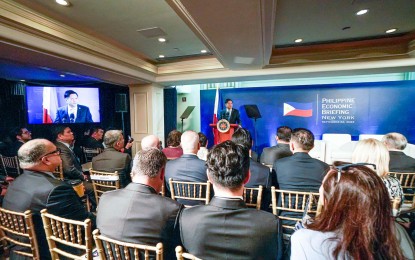
TOP SALESMAN. President Ferdinand Marcos Jr. addresses the Philippine Economic Briefing at The Carlyle Hotel in New York City, USA on Thursday night, Manila time (Sept. 22, 2022). Witnessed by his economic team, Marcos presented the status of the country’s recovery and discussed Philippine fiscal policies and programs with the international community in the hopes of bringing home more investments to secure economic growth. (Photo courtesy of BBM Facebook)
MANILA – Transition in leadership in the government usually slows down investment approvals as investors have this wait-and-see mindset until the new administration has come in, but the Board of Investments (BOI) has more than doubled its approved investments quarter-on-quarter during the first 100 days in office of President Ferdinand “Bongbong” Marcos Jr.
The Department of Trade and Industry’s (DTI) accomplishment report during the first 100 days of the Marcos administration showed that BOI has approved PHP125.7 billion worth of investments from July 1 to Sept. 14 this year -- the first 75 days of the administration.
This is 160 percent higher than the investment promotion agency’s (IPA) approvals in April to June 2022 period of PHP48.4 billion, based on figures from the Philippine Statistics Authority (PSA).
“The top industries during the period are administrative and support; real estate activities; electricity, gas, steam and air conditioning supply; financial and insurance; and manufacturing,” DTI said in its report obtained by the Philippine News Agency.
It added that the PHP125.7-billion investment approvals during the first three months of the new administration are expected to generate 9,000 fresh jobs.
Investment pledges in BOI from July to September 14, 2022 grew more than double from PHP62.3 billion worth of approvals for the entire third quarter of last year.
But, the new administration has to work harder during the last quarter of the year to achieve the agency’s PHP995.59-billion target investment approvals for 2022 as reflected in the latest National Expenditure Program (NEP).
Combined with the performance of the BOI in the last two quarters of the Duterte administration, the IPA has registered a total of PHP355.7 billion worth of projects. This means that the BOI has to attract and approve PHP639.89 billion investment pledges from September 15 until end-2022.
PBBM foreign trips to lure investments
“The recently concluded state visits of President Marcos Jr. to Indonesia and Singapore have sought to attract investments to the country,” the DTI said.
It noted that Marcos and his Cabinet members were able to attract USD7.82 billion worth of investments, of which USD7 billion were unsolicited construction projects, during the visit to Indonesia.
“Conservative estimates for the potential jobs that these investments could generate is at 7,100 jobs,” DTI added.
In his visit to Singapore, Marcos was able to bag letters of intent (LOIs) worth USD6.54 billion. These came from USD5-billion LOI of a consortium to develop e-trikes, USD1.2-billion LOI for a floating solar project, up to USD100-million LOI by 2030 in the blue economy, USD200-million LOI to set up data centers, USD20-million LOI in startup development, and another USD20-million LOI on innovation platform and investments.
Apart from these LOIs, other government agencies and the local government unit of Tarlac were able to secure partnerships with the private sector in Singapore.
On the sidelines of Marcos’ visit to the US for the United Nations General Assembly last month, DTI said the business program that was held in New York was able to generate USD3.9 billion worth of investments and business interests for the Philippines that could create over 112,000 jobs.
“The above estimates do not reflect the full potential of future investments from the several companies whom the President and the Trade and Industry Secretary met during the Presidential Visit to New York City, US. Some of these companies have expressed interest to consider new or further investments in the country but their plans have yet to be firmed up,” it added.
WFH rules cleared
Last Sept.14, the Fiscal Incentives Review Board (FIRB) finally cleared rules on work-from-home (WFH) arrangements for the information technology and business process management (IT-BPM) sector.
The FIRB, co-chaired by the DTI chief, has allowed 100-percent WFH setup for the IT-BPM industry without losing their incentives by transferring registration from Philippine Economic Zone Authority (PEZA) to BOI.
“The issue pertaining to work-from-home arrangements with tax perks given to IT-BPM companies had been resolved. Now, firms with 100 percent WFH set-up will still be able to enjoy the same incentives by simply transferring their registration from one government agency to another (PEZA to BOI),” DTI said.
It added that this policy response ensures the competitiveness of the country in normalizing hybrid work, especially for the IT-BPM sector.
“WFH/hybrid work is a game-changer for the Philippines and the sustainability of the IT-BPM industry, and it will be a contributing factor to our ability to create 1.1 million new direct jobs for Filipinos, generate billions more in revenue, and significantly increase our countryside footprint by 2028,” the IT and Business Process Association of the Philippines (IBPAP) said in its previous statement.
During the recent International Innovation Summit, IBPAP president and chief executive officer Jack Madrid shared that the industry targets to hit USD59 billion in revenues and 2.5 million full-time employees in six years. (PNA)
